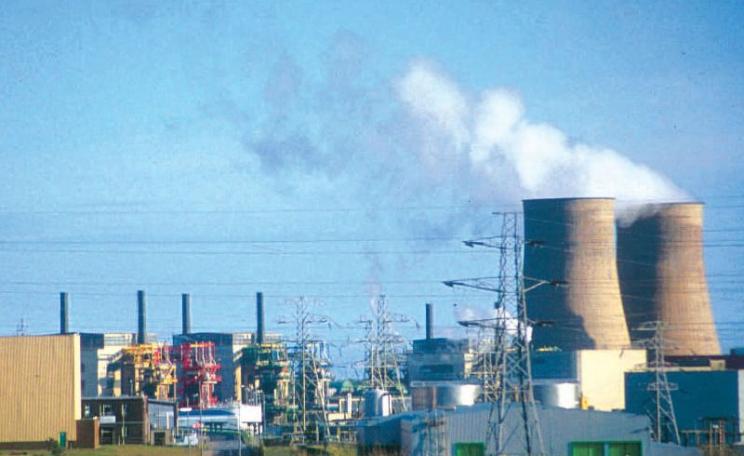Nuclear units with compromised safety systems cannot be considered safe and citizens, in Ukraine and in neighbouring countries, must be aware of that. We believe our moral obligation is to inform public of the situation as it is.
Energoatom, Ukraine's state-owned nuclear power plants operator, has just commenced legal action against the National Ecological Centre of Ukraine (NECU).
A Kiev court held just held the first hearing in the case yesterday, in which Energoatom accused the NECU activists of "spreading false information" on Ukraine's nuclear reactors that are operating beyond their design lifetime with many known faults.
"This lawsuit was filed simply because we dared to openly call things what they are in reality", says Iryna Holovko, NECU and CEE Bankwatch Network campaigner in Ukraine.
"Nuclear units with compromised safety systems cannot be considered safe and citizens, in Ukraine and in neighbouring countries, must be aware of that. We believe our moral obligation is to inform public of the situation as it is."
The 1986 Chernobyl nuclear catastrophe, which scattered radioactive fallout across Europe from a failed RBMK 1000 reactor, took place in Ukraine. Even after the Fukushima diaster in Japan, Chernobyl is thought to be the world's worst ever nuclear accident, responsible for 100,000 or more deaths.
Retract or else!
Energoatom's lawsuit refers to NECU's press release from 15th May 2015, which reported that Unit 2 in the South Ukraine nuclear power plant (SUNPP) does not comply with the requirements to safely generate electricity, while decisions taken by Ukrainian authorities to allow nuclear units' operation beyond their design lifetime "lack crucial substantiation".
"Unit 2 at the South Ukraine nuclear power plant recorded 33 deviations from standards and rules of nuclear and radiation safety", the press statement reported. "However the nuclear power plant operator, Energoatom, plans to claim a significant number of derogations from those rules and standards by December this year.
"Energoatom's statements are disturbing civil organizations, as it is using the excuse of a 'cold winter' to connect to the network without completing all the required measures, with no further action plan in case of failure of the power units.
"Unfortunately Ukraine is still operating reactors after the end of their design lifetime without completing all necessary measures to improve safety, and without sufficient justification. For example, in 2013 the SNRCU continued operation of SUNPP's Unit 1. This is evidenced by the research of independent experts who reviewed the report on the state of the reactor vessel."
Nuclear units with compromised safety systems cannot be considered safe and citizens, in Ukraine and in neighbouring countries, must be aware of that. We believe our moral obligation is to inform public of the situation as it is.
In its lawsuit, Energoatom asked the court to order NECU to publish a statement on its website saying some of the information in the original press release was false. However NECU insists that all the information published was accurate.
Ukraine must comply with international obligations
In April, two weeks before this 30 years old nuclear reactor reached the end of its design lifetime, the board of Ukraine's nuclear energy regulator SNRIU acknowledged the unit has 41 deviations from safety standards.
Consequently, the nuclear unit was not granted a permission to continue operation and it has been shut down since. Its restart, the board ruled, would only be considered once all required measures and safety upgrades are completed.
The EU is actively involved in the revival of Ukraine's nuclear energy. Energoatom enjoys generous financial support from Euratom and from the European Bank for Reconstruction and Development (EBRD) to implement safety upgrades in its nuclear units, which are in turn used for legitimising a postponed expiry date.
However Energoatom has been ignoring Ukraine's legal obligations under the Aarhus and Espoo Conventions for transboundary consultations, as well as specific conditions attached to the EBRD and Euratom loans.
Ukrainian environmental NGOs - including Ecoclub-Rivne, NECU and others - have been campaigning since more than five years for of the public's right to be fully informed and engaged in the decision-making process regarding the prolonged operation of nuclear units beyond their design expiration date.
Don't stifle critics, engage with them
This year civil society groups in five EU countries have joined the campaign to demand citizens in Ukraine's neighbourhood are fully informed about the potential transboundary implications of these plans and have a say in the process.
In July this year 25 Members of the European Parliament signed a letter to Euratom and the EBRD asking they suspend their loans for Ukraine's safety upgrade programme until the country complies with the relevant international legal obligations.
"If Energoatom is concerned about its reputation", says Holovko, "it would be wiser to directly engage with the public on its plans and their long term implications rather than trying to stifle civil society critique."
The next hearing in the case is scheduled for 28th September.
More: National Ecological Centre of Ukraine (NECU) is a civil society group created in 1991 when Ukraine obtained independence. NECU consolidates individuals for common action to protect the environment. Among NECU members are scientists, journalists, artists, students and other people who are willing to add their own effort to environmental protection. The organization has branches in a dozen of Ukrainian cities. NECU is a member of the CEE Bankwatch Network.
Source: BankWatch.







